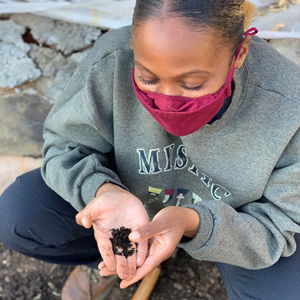Composting 101 with Sustaining Way
May 28th, 2021
Sustaining Way's Sustainability Coordinator Danielle Parks
If you want to start composting but aren't sure where to begin, Danielle Parks, Sustainability Coordinator at Sustaining Way, breaks down what you need to know below. Thanks, Danielle!
Click here to view or download this information as a PDF
Compost is an organic material that can be added to soil to improve soil's quality and help plants grow.
The three basic ingredients of healthy compost are:
- Browns: carbon-rich materials, such as dead leaves, branches, and twigs.
- Greens: nitrogen-rich materials, such as grass clippings, vegetable waste, fruit scraps, and coffee grounds.
- Water: moisture helps break down the organic matter.
What to compost:
- Fruit and vegetable scraps
- Eggshells
- Coffee grounds and filters
- Tea bags
- Nut shells
- Shredded newspaper, cardboard and paper
- Yard trimmings, hay, straw, leaves, and grass clippings
- Sawdust and wood chips
- Dryer and vacuum cleaner lint
- Cotton and wool rag
- Hair and fur
- Fireplace ashes
- Houseplants
What not to compost:
- Black walnut tree leaves or twigs
- Coal or charcoal ash
- Dairy products (butter, milk, sour cream, yogurt) or eggs
- Diseased or insect-ridden plants
- Fats, grease, lard, or oils
- Meat or fish bones and scraps
- Pet waste
- Yard trimmings treated with chemical pesticides
Composting at Home
Backyard composting:
- Select a dry, shady spot near a water source for your compost pile or bin
- Add brown and green materials as they are collected, making sure larger pieces are chopped or shredded
- Moisten dry materials as they are added
- Once your compost pile is established, mix grass clippings and green waste into the pile and bury fruit and vegetable waste under 10 inches of compost material
Indoor composting:
- A closed-composting system will work best for indoors
- A properly managed indoor compost bin will not attract pests or rodents and will not smell bad. Your compost should be ready in two to five weeks.
Primary macronutrients used by plants
Nitrogen (N): plant development
Found in chlorophyll, nucleic acids and amino acids; component of protein and enzymes
Phosphorus (P): root development
An essential component of DNA, RNA, and phospholipids, which play critical roles in cell membranes; also plays a major role in the energy system (ATP) of plants
Potassium (K): resistance to disease
Plays a major role in the metabolism of the plant, and is involved in photosynthesis, drought tolerance, improved winter hardiness and protein synthesis
If soil is low in nitrogen
Action: plant a nitrogen-fixing crop, such as a legume (e.g. beans, peanuts, peas, white clover)
Note: if planting an edible crop (e.g. peanuts) consider green mulching after harvesting. This involves placing the crop on the ground and letting it decompose. No more work required.
If soil is low in phosphorus
Action: use animal manures (e.g. chicken, pig, horse)
Note: bury it in the ground and wait at least 120 days before planting in the area. Avoid planting vegetables planned to be eaten raw in areas where pig manure is placed.
If soil is low in potassium
Action: make a fertilizer or compost tea from banana, leafy greens, onions, potato, sweet potato.
Benefits
- Enriches soil, helping retain moisture and suppress plant diseases and pests
- Reduces the need for chemical fertilizers
- Encourages the production of beneficial bacteria and fungi that break down organic matter to create humus, a rich nutrient-filled material
- Reduces methane emissions from landfills and lowers your carbon footprint
Click here to view or download this information as a PDF
Sustaining Way, a 501(c)3 formed in January 2012, is an interfaith non-profit that uses education, collaboration and advocacy to create sustainable, caring and equitable communities for current and future generations. Sustaining Way uses a unique community-based approach to sustainability through its demonstration site Annie’s House, just off the Swamp Rabbit Trail in the historic Nicholtown community of Greenville, SC.
For their work to cultivate a thriving, sustainable, and equitable environment in Greenville’s Nicholtown and surrounding communities, Sustaining Way is the recipient of the 2021 Environmental Equity and Justice Award.

